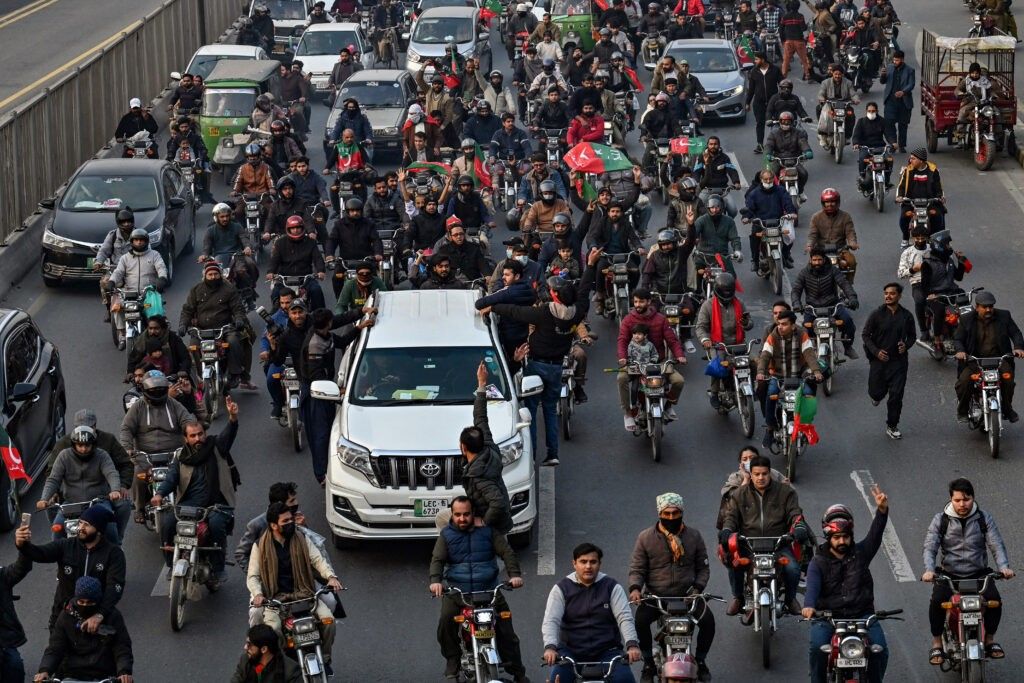FORMER Pakistan prime minister Imran Khan is popular in his constituency and ancestral homeland of Mianwali, but the political posters that line the streets do not bear his face and flags do not fly his colours.
A relentless crackdown widely attributed to Pakistan’s powerful military has seen him and his Pakistan Tehreek-e-Insaf (PTI) party almost erased from the poll campaign ahead of the vote.
“Our party workers are facing harassment, and I personally have received death threats,” said 61-year-old Jamal Ahsan Khan, who is PTI candidate in Mianwali in place of his leader. “All my life, I have never witnessed an election as intense and threatening as this one.”
Khan, currently in jail facing dozens of legal challenges, is barred from contesting elections on Thursday (8) because of a graft conviction – cases he claims are politically motivated.
Across the country, PTI has been obstructed from holding rallies and the heavily censored media is restricted in its coverage of the opposition, pushing the party’s campaign almost entirely online.
Dozens of candidates nationwide have also had their nomination papers rejected by the electoral commission.
Like many other party candidates, loyalist Ahsan Khan has been in near hiding in the buildup to the election, unable to hold meetings or pass out leaflets.
“It feels disheartening that, as a candidate of Pakistan’s leading political party, I am unable to conduct my campaign in a meaningful way,” he said.
With the vote next week, there is none of the fervour and excitement that usually mark an election in the country of more than 240 million people.
It was from Mianwali, a largely rural district in the central province of Punjab, that Khan built his political career and was elected three times as MP.
PTI’s national victory in 2018, driven by its promises to put an end to corruption and the family dynasties which have ruled for generations, propelled him to become prime minister.
In Mianwali, where he notably built a hospital and a university, the 71-year-old “is not just a political figure; he is a hero”, Rana Amjad Iqbal, editor-in-chief of local newspaper Nawa-e-Sharar, or the Daily Spark, said.

“However, the primary and most significant reason for his enduring political relevance lies in his anti-establishment stance,” underlines the journalist.
Khan was believed to have been backed by the military in his rise to power, but became emboldened during his leadership and began to rebel against the control of the mighty generals.
Eventually, he lost their favour and was ousted in a parliamentary no-confidence vote in 2022 after dozens of his MPs defected.
His subsequent arrest in May 2023 brought supporters onto the streets who protested against military symbols – sparking the start of a widespread crackdown against PTI.
Thousands of supporters were arrested and around 100 – half from Mianwali – are awaiting trial before military courts, while senior party leaders were detained and forced underground before defecting in their dozens.
Khan “is still popular with the public, but he is unacceptable” to the army, retired schoolteacher Ijaz Khan said.
PTI suffered a crucial blow in January when the Supreme Court banned it from contesting elections with its electoral symbol, the cricket bat.
The election commission instead ordered Ahsan Khan to use a bottle, an emblem viewed with disdain in rural areas because it is associated with alcohol.
Khan’s rival in Mianwali, Obaid Ullah Khan, is indifferent to the punishment meted out to his rival political party. “When would it be justified if not now?” he said of the crackdown.
Unlike PTI candidates, Ullah Khan, who is standing for the Pakistan Muslim League (PML-N), meets openly with villagers, whose leaders assure him of the support of the entire community, in hope of future favours.
The PML-N is the party of former prime minister, Nawaz Sharif, who was jailed ahead of the 2018 election and later forced into self-imposed exile. As Khan’s downfall became a landslide, Sharif has risen, returning to his country and into the arms of the military, analysts said.
Despite being sidelined from the election campaign, voters have not lost their love for Khan.
Hanzala bin Shakeel, a 23-year-old computer science student, will vote for the first time and is making no secret of his choice.
He said, “I will vote for (Imran Khan) because he is the only one who really cares about this country; the others prioritise their personal interests.” (AFP)
